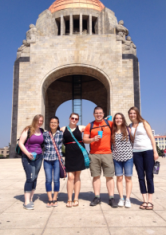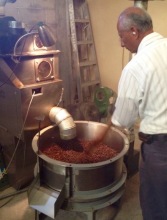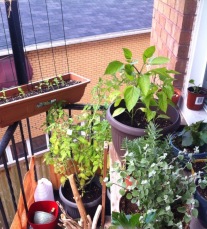Thomas Coldwell is currently volunteering with MCC Ottawa and interning as Associate Pastor with the Village International Mennonite Church. In fall, he will join MCC Alberta as Peace and Community Engagement Coordinator. This blog was originally posted on the MCC Ottawa blog.
This past May, I co-led the MCC Alberta/Saskatchewan Uprooted 2015 deleg ation to Guatemala, Mexico, and the United States. We learned about migration.
ation to Guatemala, Mexico, and the United States. We learned about migration.
Many in Mexico and Guatemala (and Canada, too) migrate for economic reasons. They are unable to sustain a decent standard of living due to poverty or a lack of job opportunities.
Some migrants, especially from the rural areas, are small-scale landless subsistence farmers (or campesinos) who are unable to earn a sustainable income from the crops they produce. A lot of these crops—like coffee and flowers—are major exports, destined for countries like Canada.
Other migrating peoples are forced from their homes due to violence or instability. Across the region, people are leaving the familiar in search of both safety and economic opportunity. We met MCC partners helping peoples on the move and supporting initiatives for alternatives to migration.
Since arriving back in Ottawa, I find myself more often reading the “Product of…” labels on the foods I buy. My favourite yellow mangoes sold by street vendors in Mexico City are also available at my local grocery store. Our world is very interconnected—especially when it comes to food and drink.
 Ah, coffee. The smell. The taste. I wouldn’t say I’m a committed coffee-drinker (coffee and tea are equally enjoyable), but I do like a cup o’ joe. And so do many others: over 14 billion cups of coffee are consumed in Canada ever year (according to Statistics Canada). That’s about 398 cups of coffee per person per year (more than a cup-a-day for everyone in Canada). Coffee’s a big deal! And in 2009, most of Canada’s raw coffee was imported from Colombia, Brazil, and Guatemala.
Ah, coffee. The smell. The taste. I wouldn’t say I’m a committed coffee-drinker (coffee and tea are equally enjoyable), but I do like a cup o’ joe. And so do many others: over 14 billion cups of coffee are consumed in Canada ever year (according to Statistics Canada). That’s about 398 cups of coffee per person per year (more than a cup-a-day for everyone in Canada). Coffee’s a big deal! And in 2009, most of Canada’s raw coffee was imported from Colombia, Brazil, and Guatemala.
During the learning tour, we visited Cafe Justo (“Just Coffee”)—a coffee co-operative of over 100 families in Mexico. The coffee beans are grown and harvested in the Chiapas region and sent to roast in Agua Prieta on the Northern border. Small-scale farmers often get the shorter end of the stick when competing with agri-businesses in places like Mexico and Guatemala. Traditionally, the “middle-man” buys coffee from the farmers to sell to the manufacturers for a profit. This often leaves the farmers with insufficient funds for their basic needs. The Cafe Justo co-operative sells directly to the consumer (businesses, churches, and individuals) after deciding what their coffee is worth. This business model has allowed 100 families to reach a decent standard of living without having to migrate.
Supporting fair trade helps small-scale farmers live with dignity in their communities. It provides choice: to leave or not to leave.
This summer, Jen (my wife) and I decided to grow a garden on our patio. It’s been a fun journey as we’ve witnessed seeds sprouting and transforming into vibrant, green plants. Watching our flowers bloom has also been a joy for us!
While in the Guatemalan highlands, the Uprootedteam visited MCC partners in Tonina who grew organic vegetables and flowers with no chemicals. Their gardens were beautiful. They sell their flowers across the border in Mexico. Many of the flowers imported to Canada from Latin America are grown under harsh labour conditions with high chemical usage, putting both workers and the environment at risk. But working in the flower industry is the primary source of income for some.
The question I ask myself is: How then shall I live? I find myself more concerned about the type of chocolate I purchase (and I love to purchase it). Or the coffee I drink. Or the flowers I enjoy. Purchasing fair trade is one way to support my global neighbours. Being mindful of systems and processes that do not always promote the well-being and dignity of people is part of my journey. Considering fair trade first (both globally and locally) can lead to decisions that will positively influence the lives of others.
But is it really worth it to support fair trade cooperatives? After all, it’s just coffee and flowers. And yet coffee and flowers allow people to feed their families, support their children’s education, and remain in their regions without needing to migrate for economic purposes. These projects serve as alternatives to migration.
When justice is partnered with human-centered business, the outcome is “just coffee” or “just flowers”—which means more than I can fully comprehend.

I like the article very much , I am Agronomist part of my family produce coffee and we need market , the global economic system is killing the small producers .